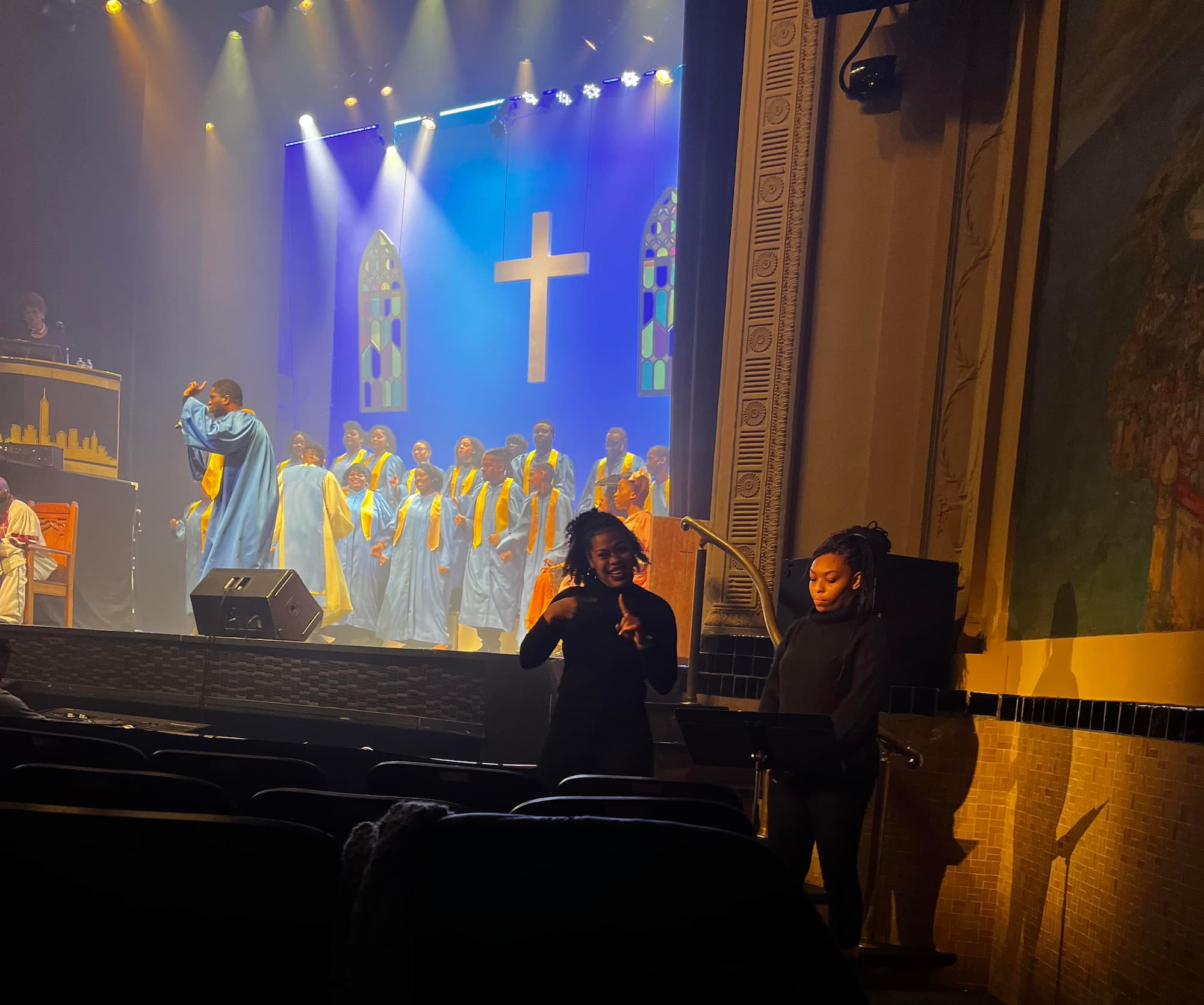Religious Interpreting
Inclusive interpreting services to engage Deaf and hard-of-hearing congregations in your church, temple, mosque, zendo, or other place of worship.
What is Religious Sign Language Interpreting?
One of our fundamental convictions is that everyone should be able to practice their religion of choice. Every person, whether they identify as Christian, Catholic, Muslim, Buddhist, or none of the above, deserves to be part of a religious community.
Those who use American Sign Language as their first language may find it challenging to understand religious texts and rituals due to the abundance of metaphors and allegories used. It is important to have a trained Religious Interpreter present at any religious gatherings where the Deaf community will be present to ensure that they are equally included and represented.

Who Benefits from Religious Sign Language Interpreting?
Religious interpreting serves anyone who is Deaf, Deaf-blind, hard-of-hearing, late deafened, or who struggles with other communication barriers. Many different cultural norms and considerations exist among religions. A professional Religious Interpreter treats religious traditions with reverence and strives to ensure that all believers have equal access to their faith and worship practices. They respect the beliefs of their Deaf customers and are mindful of what is considered “allowed” and “forbidden” in the religions they serve. They will have an understanding of the institution’s structure, its holy sites, and the proper duties for men, women, and community members
Confidential conversations between hearing and Deaf members of the same faith can be greatly aided by the presence of a trained Religious Sign Language Interpreter. Spiritual leaders and their congregation members must be able to confide in one another openly and honestly in order to have meaningful counseling sessions, confessions, and other private conversations of a spiritual or supportive nature. Professional Religious Interpreters keep client information private and maintain objectivity in accordance with the NAD-RID Code of Professional Conduct.
Why is Religious Sign Language Interpreting Important?
Any spiritual event, from Sunday services and youth group gatherings, to weekend retreats and nuptial ceremonies, may necessitate the services of a qualified Religious Interpreter. People who rely on ASL interpreting services need easy access to religious communities and spoken messages of faith. Deaf persons should be given the opportunity to experience the value of community that is fundamental to many faiths.
Not every interpreter needs to be a religious scholar, but they should have a firm grasp of the faith they’re tasked with conveying to their clients. They need to be able to recognize the intent and reverence of often recited prayers, hymns, songs, and poems. Skilled interpreters of religious texts are well-versed in religious history and current events and will understand the significance of religious holidays.
Religious interpreters often partake in continuing education so that they can give their clients the best service possible, especially for the benefit of the Deaf religious congregations they serve. The best way for an interpreter to ensure their qualifications for a religious event is to work with seasoned mentors, network with others in the profession, and request feedback from Deaf members of the faith community.
In the absence of a trained Religious Interpreter, other congregation members’ focus may be diverted to interpreting for a friend or relative, which can negatively impact the intended experience of everyone at the religious gathering. Furthermore, untrained interpreters may misinterpret the message or inject their own bias into the communication. Professional religious interpreters have unique abilities that allow them to convey the meaning of religious texts with precision, depth, and neutrality.
Why Choose Inclusive Communication Services for Religious Sign Language Interpreting?
Aside from their proficiency in English and American Sign Language, our Religious Interpreters also have a working knowledge of the original language of religious texts, such as Arabic, Hebrew, or Latin. Our professional Religious Interpreters understand the significance of conveying spiritual truths exactly as they are spoken. They also understand the significance of faith-specific terminology, prayers, rituals, and observances.
Our Religious Interpreters won’t take jobs when their own views prevent them from providing objective services.
Whether for religious services, activities, counseling, or other faith-based events and outreach, ICS is available for quality accommodation and accessibility solutions. ICS’s interpreters are experienced with congregations of all sizes, whether interpreting from the podium of the Cathedral Church of Saint John the Divine or intimately in a local Bible Study. Because all our interpreters are professionals who adhere to the same Code of Professional Conduct, we are in a class of our own. You’ll discover people who, through their expertise, professionalism, and good nature, hope to uplift and impact lives and spread religious messages transparently.
The right to freely practice one’s religion in a way that is private and meaningful is a fundamental right. The New York area is served by Inclusive Communication Services’ Religious Interpreting professionals, who strive to ensure that nobody is deprived of this very fundamental right.
Here at ICS, we value the importance of faith in people’s lives and work hard to ensure that the Deaf community has full access to any and all houses of worship and practice. For more information on how to improve accessibility and inclusion within your religious group, reach out to one of our friendly accessibility coordinators today!
Sign language, Captioning, and Accessible Media Services
Premium accommodation services for the Deaf, Deaf-blind, blind, and hard-of-hearing. Available in Person and Online!

Tips for Working with Religious Interpreters
- Request an interpreter as soon as you schedule your service or celebration. The earlier your request your accommodations, the more likelihood we have a professional available who matches your religious background.
- Communicate to an ICS coordinator the nature of your religious services as well as any specific requests to adhere to while in your place of worship, including wardrobe accommodations or customs to observe while on-site.
- Preparation materials ensure that the interpreter has the tools to produce the best quality work possible. Agendas, outlines of the service, music sheets, or formal readings should be shared with a coordinator as soon as available.
- Respect the interpreter’s scheduled end-time. If you need to extend your services, reach out to an ICS coordinator immediately.
- Allow the interpreter to sit or stand toward the front of the space, with a clear sightline of your Deaf and hard-of-hearing attendees. If necessary, reach out to an ICS coordinator to assess your specific site and to advise on the optimal placement for interpreters.
- Once the ceremony or service begins, avoid speaking directly to the interpreter or asking the interpreter to participate. The interpreter will be focused hard at work on providing accessibility to your congregation.
- Although you may wish to highlight the addition of an interpreter to your place of worship, it is not necessary to introduce the specific interpreter(s) unless you desire.
- Still unsure? Reach out to a coordinator to ask a question or discuss how to prepare for your service request.
Caption & Sign Language Accommodations: Religious Services
Translating spoken language into sign language or text captioning is not easy, especially if on the spot in front of a mixed-ability congregation of Deaf, Deaf-blind, hard-of-hearing and hearing participants. But you can count on Inclusive Communication Services to provide accurate and quality religious accommodations that afford equal-access to your spoken message via qualified sign language interpreters, media accessibility talent, and caption providers.
- Our sign language professionals are versed in a variety of Sign Language modalities and forms, including all the body movements, facial expressions, and signs incorporated into this complex language. Sign language interpreters are available to appear on-stage, on-screen, or as personal interpreters to ensure equal-access and inclusion of congregants with hearing loss.
- Our media accessibility talent include professional sign language interpreters, caption providers, and voiceover artists that ensure all aspects of your media – whether visual or auditory – are accessible to those with hearing loss or vision loss. Media accessibility talent can add an in-frame interpreter, multilingual captioning, or visual description voiceover with a multitude of customizations to meet any communication or accommodation need. The end result is an inclusive media product that’s completely accessible to your mixed-ability audience!
- Our caption services are available as a general accommodation or individual accommodation, depending on the needs of your congregation. For open-caption services, the transcribed audio is displayed as text on the service’s main screen to provide equal-access to those who do not utilize an interpreter. For closed-caption services, our providers can issue private links that open in discreet windows for those who are late deafened or hard-of-hearing to have equal-access to the auditory message.
Whether Christian, Jewish, Muslim, Hindu, or Buddhist, Inclusive Communication Services has accommodation professionals including proficient sign language interpreters, premium accessible media talent, and top-quality caption providers to ensure your business and government events run smoothly and inclusively.
Let’s start planning your next event! Speak to one of our representatives at (347) 927-5770 or write to us at info@inclusiveasl.com.
Frequently asked questions
- Firstly, sign language interpreting is an exhausting job and drains your energy fast. Having a team of two or more interpreters allows them to switch the position at brief intervals of 15-30 min.
- Secondly, it ensures that you have a supporting interpreter to maintain the accuracy and quality of the sign language translation and provide effective communication without any error.
For more visit our dedicated FAQ page
Need a professional sign language interpreter, caption provider, or media translator?
Making ADA accommodations simple and inclusive!
We are here to help you!



